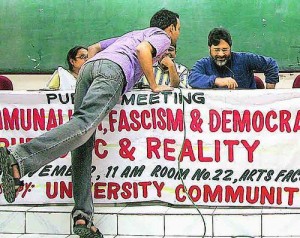Black black Sun
Blackish Sun
Blackness blackness Sun
The Sun of the winning path
The Sun of charms
The beautiful Sun
The beautiful Sun
The Sun of the leaf sandals
The Sun of the sowing season
The Sun of the dark clouds
The Sun of rain drops
The little Sun
The Sun singing lullabies
In the eyes of the corn
The Sun on the food basket slung from the beam
The Sun in the clay pot
The Sun of beef curry
The Sun of cold food
The Sun who dances
In the thatched hut
The Sun of the ear of corn
The toddy tapping Sun
The matangi1 Sun
The gosangi1 Sun
The Sun who smiles in the cockleshell mirror
The Sun who dances wearing snail-shell anklets
The Sun of charms
The beautiful Sun
The beautiful Sun
The untouchable Sun
The Sun who was burnt to ashes alive
The Sun who rose from the ashes blazing
The Sun who bled on the fields of Karamchedu
The Sun who learns to walk on the path of blood
The Sun in the gunny sack on the waves of the Tungabhadra2
The Sun who befriends
Swarnamma3of the sweat drops
The Sun who gives his heart
To the crescent moon Yesanna3
The Sun of the flaming spark in Alisamma's4 vows
The Sun of righteous sharpness
In Anil Babu's5 eyes
The Sun of the army of ants in the Sikkolu6 hills
The Sun who swims against the flood of the Godaari7
Shambhuka's decapitated head like Sun
The Sun of Ekalavya's chopped thumb
The handsome Sun with the index finger
The Sun of twilight
The moon like Sun
The Sun of the blue flag
The Sun of black gemstones
The brave Sun
The Sun of daggers
The Sun of tears
The Sun of timeless wisdom
The Sun who has bloomed
On the righteous path of Dhamma
The brave Sun
The Sun of the winning path
My translation of the Telugu poem 'nallaaTi suuriiDu' by K. G. Satyamurthy ('Sivasagar'); from his collection of poetry 'Sivasagar kavitvam'.
The poet says this poem is a continuation of his efforts to define 'daLita soundarya Sastramu' or Dalit aesthetics.
[1] matangi and gosangi: a reference to the Madigas; gosangi also refers to cobblers, ascriptive occupation of the Madigas.
[2] Tungabhadra: a reference to the Tungabhadra canal of the Krishna irrigation system which supplies water to farms in parts of Guntur district. Here, the poet talks about the mutilated bodies of the Dalits killed in the Chunduru massacre (1991) which were wrapped in gunny sacks and thrown into the Tungabhadra canal.
[3] Swarnamma and Yesanna: some common names among Dalits in Coastal Andhra. The poet could also be referring to the Dalits' role in labour (Swarnamma is derived from 'swarNamu' which means gold or wealth or its production, in general); yEsanna refers to Jesus Christ, or spiritual liberation.
[4] Alisamma: was a key witness in the Karamchedu massacre (1985) as her own son Duddu Vandanam was also killed in the massacre. The courageous woman had braved many threats and inducements to speak about the killings in many public meetings and was ultimately also murdered, two years after Karamchedu.
[5] Anil Babu: Kommerla Anil Kumar was a witness in the Chunduru massacre. Balagopal, the human rights activist, had written: Anil Kumar was 'an articulate young dalit who survived the massacre of August 6 to give a graphic account of the incident but was shot dead by the police on September 10 in the course of an attempt by the latter to remove a hunger strike camp set up by the daiits at Chundur.'
[6] Sikkolu hills: Srikakulam; this is a reference to the one of the earliest Naxal movements.
[7]: Godaari: The river Godavari.

